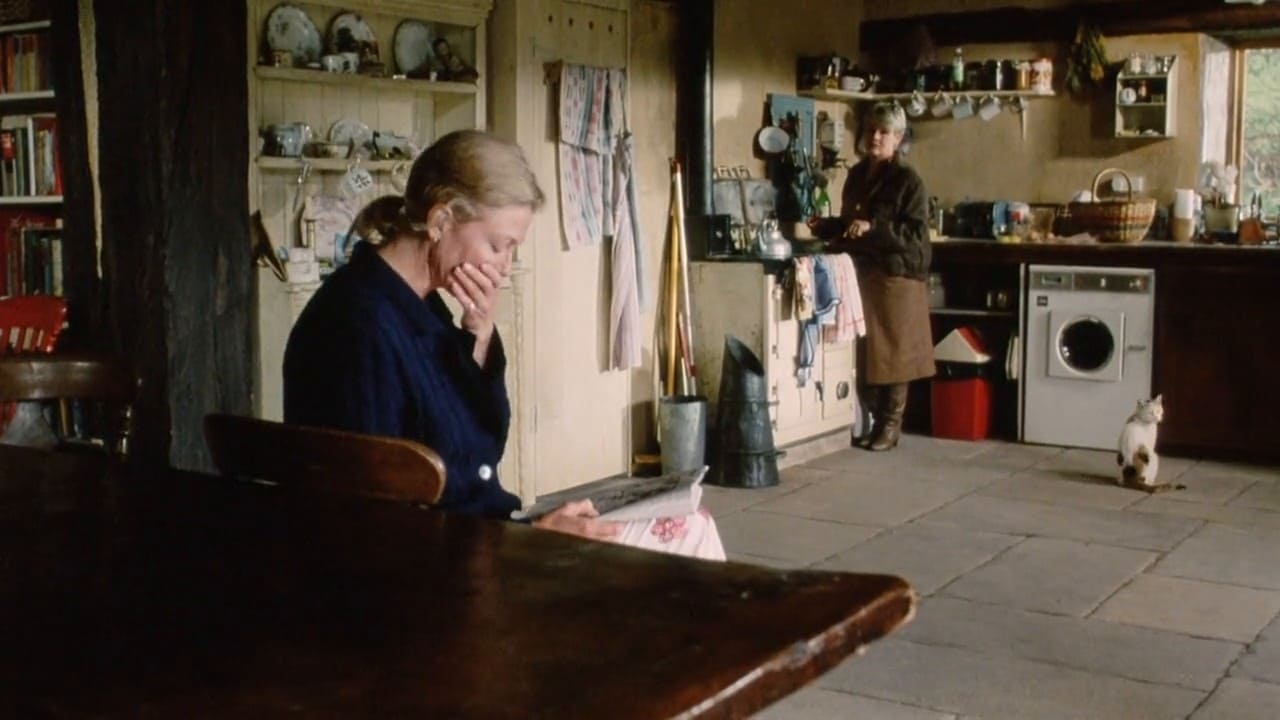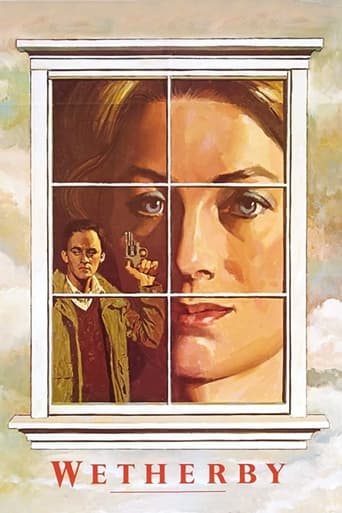ada
the leading man is my tpye
ChicDragon
It's a mild crowd pleaser for people who are exhausted by blockbusters.
pointyfilippa
The movie runs out of plot and jokes well before the end of a two-hour running time, long for a light comedy.
Lorene Anderson
Besides qualms with the musical score, Wetherby has a killer script, intriguing editing, fantastic acting (Vanessa Redgrave is incredible), and a compelling idea driving the film. The echoes of film noir in the intense, high-contrast lighting and the starkness of the violence was perfect, especially when combined with naked silence. It is more than a story about a disturbed young man who shoots himself in front of an aging school teacher, Jean Travers (Redgrave). That comes early in the film. It is about the psychological consequences for Jean in her life and past, violently revealed through that shocking act. Life can never be normal again. Beneath even the most pleasant veneer lurks sadness, secrets, and dark sexuality.
Zootz Simms
This is a great film. I just saw it for the first time. The comment above is completely wrong, however. I must set the record straight. The military scenes are not US soldiers, but rather a flashback for Vanessa Redgrave to a love lost. Royal Air Force, sir, in Malay. I whole-heartedly recommend the film. It has a great dramatic score. It also has tackles some real dark ideas about love and life. And it has a pace that doesn't exist anymore in many films, especially those with stars. Great performances from Ian Holm and Tom Wilkinson. Also a fine performance from a very young Joely Richardson (Vanessa Redgrave's daughter), who now stars on FX's Nip Tuck.
loydmooney
Another puzzle movie where there is are ludicrously scrambled pieces. If this is all about loneliness and despair, look at how much more gripping something like The Entertainer is. There is something extremely shallow about this film: I guess if you want to make something about despair and keep it really boring, really empty, voila, then people can read about what they want the full extent of their own despair and loneliness into it. Probably one of the reviewers here is very right: Pinter seems always lurking in the wings of any scene. Hare, however is certainly his own man, very determined fellow to lead us nowhere with some kind of minor supine surprise at the end, to let us think we have solved the Rosebud mystery of this movie: like Kane, another jigsaw puzzle of a movie.Even Kubrick's The Killing, another scrambled movie, though hardly on this scale, would have been better told straight forwardly. Moreover, notice the blah response of the great unwashed public to this film. This baby shot past them on quiet rails in the dead of night, because it was just too tortured for its own good.As for a great performance by Redgrave, well, sure. The woman cannot deliver a single unbelievable line. She is one of the great great actress of all time: spooky how she disappears into every role she ever did. The only real puzzle for me, is...you guessed it. Why did they ever bother to shoot the first reel.
humbleradio
(possible spoilers)I agree with the above comments almost entirely with the small exception of the importance that the 80's political scene played as any kind of thematic backdrop for the story.On the contrary, the WWII era, if anything, was to be the backdrop for the contemporary happenings within the plot.I think the above commenter is reading too much into the mention of Nixon in the film and possibly projecting his/her own political leanings - obviously anti-Thatcher/Reagan - onto those of David Hare, the writer and director. In terms of Richard Nixon, who is mentioned in an anecdotal way at the outset of the story, Ian Holmes' character appears to sympathize with the former president when discussing a rumour about Richard and Pat's early courtship. And Venessa Redgrave's character admits things would "liven up" in their pub were the former president to suddenly appear. These are not the words of people suffering from "negative progression" as stated in the above comment.The characters played by Redgrave, Holmes, Dench, not to mention the key character of John Morgan, are all in one way or another involved in academia. (though Holmes plays a barrister.) They live quite comfortably and somewhat happily - within the confines of the plot and theme of loneliness, and aloneness of course. Redgrave's country home would be an enviable house to live in by anyone's standards. To say that this is an environment of "Thatcher chaos", as the above commenter states, is quite off the mark, I feel. The story is about normal people, somewhat lonely, in the upper middle class regions of society living their lives, waxing philosophy and working at their jobs, when a young stranger (youth is an important aspect of the theme) appears and upsets their lives with his dramatic actions. This stranger's "behaviour" does not make them question their lives, nor does it need to. (They are all confident in their own beliefs and values.) It simply, as Redgrave hints in the pub, livens up the place. Breaks up the monotony. Changes the daily talk, the daily complaints to something a bit more meaningful.It is a common misconception to interpret films as a 100% reflection of the political climate of the time. This mistake has been repeated throughout the history of film criticism. One good example is the much repeated "red scare" explanation to Don Segal's Invasion of the Body Snatchers. Segal himself, claims the comparison is nonsense, and he was simply making a thriller. A scary monster movie with no monsters.Overall, Wetherby is an excellent film with noteworthy performances by the cast. Stuart Wilson, particularly stands out among them. So, as I've stated, I think the above commenter made an almost perfect review of the film aside from the perceived importance of the political background at the time of shooting. Politics, like it or not, isn't always at the source.

